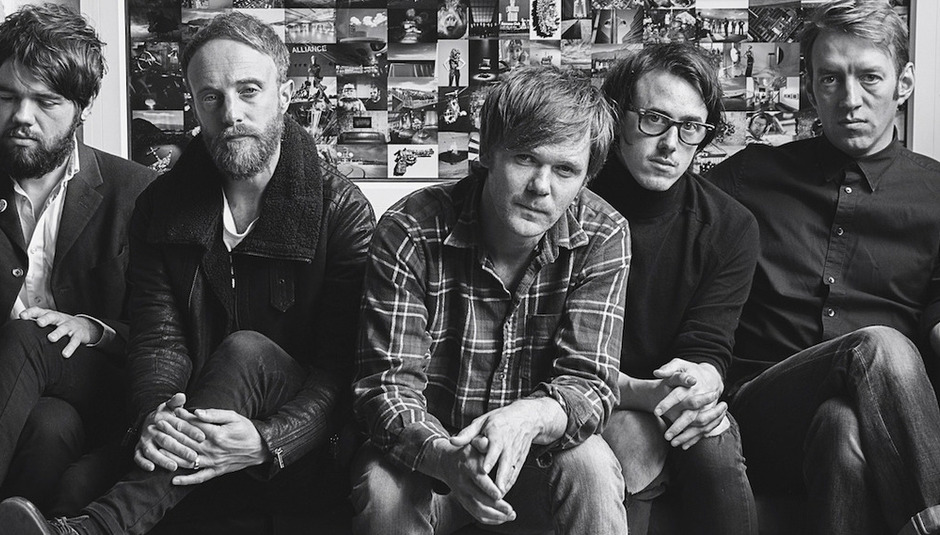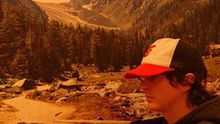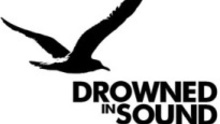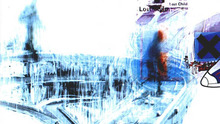DiS has a chat with one of our most beloved bands about their fantastic forthcoming album Everything Ever Written. Before we crack on to find out more about Idlewild's eighth record, here's an exclusive stream of new song from it entitled 'Come On Ghost'.
Once upon a time there was a band called Idlewild (or as a certain pedigree of fan would have it iDLEWiLD) they had cult-like obsessed fans and a proper character arc. They started the story as a scrappy Dischord-records-obsessed indie-hardcore four piece who fell in love with melody, wrote a couple of disjointed popcore masterpieces that made people shout “SHAPES!” really loudly at unexpected times (“SHAPES!”) went on a major R.E.M. binge that made them a sort-of-commercial property and the next-big-indie-thing, complete with proper ballads and emotive bits, and played Glastonbury as the sun set; still being spiky and brilliant live and shouting “SHAPES!” There was ‘American English’, ‘You Held The World In Your Arms’, ‘Love Steals Us From Loneliness’, lighters aloft, sing-a-longs, moshpits, screaming girls. The world was, indeed, in their arms.
Then they left the major label, they stopped the spiky punk-indie thing and the spotlight, as singer Roddy Woomble puts it “moved on to Franz Ferdinand,” much to his relief. They released two more albums to a fanbase that was becoming, in Spinal Tap terms, “more selective.” Woomble built a new career as an island-dwelling solo folky and his group scattered to the winds. From where I was sitting, there was a sense of five men who had fallen out of love with their own band.
About five years ago, Idlewild finally, quietly, faded off the page. This is the story of what happened next.
2015 see’s a new Idlewild album, Everything Ever Written a record which is, genuinely, hand on heart, one of the best things they’ve ever done, and possibly one of the finest releases of its kind this year. In some ways they’re a new band entirely (for a start multi-instrumentalists Lucci Rossi and Andrew Mitchell are brand-new to the fold) and in others they’re still, warmly, the Idlewild of old. The spotlight may have moved on, but the men in its glare remain.
“My interest was kind of decreasing with what, latterly, we did with Idlewild,” says singer Roddy Woomble, “because it was very traddy rock-band, you know, rhythm player, lead player, bass, drums - I think we made some great records like that and had some great concerts, but I wasn’t interested in doing that.” The story of Everything Ever Written is that of a band rediscovering and re-imagining themselves from scratch.
The band have come back from the cold, and they’ve come back, well, warm “I’m not really a fan of these modern, really bright, brash records.” says guitarist Rod Jones, “Certainly not anymore. I spent a long time before we even began to record thinking about where it was going to go. The warmth comes really from the depth, everything being much more muted. I’m a big fan of Wilco and Jeff Tweedy, I’m a big fan of how their records are so much lower than other peoples, not in terms of volume but in terms of tone. I like to think of them as thick, like a nice thick broth. It’s a strange analogy, but that’s the one we use.” This makes Woomble laugh, “How Scottish can you get?” It’s not a bad shout though - Everything Ever Written is a Scotch broth of an album, defined by a filling warmth and made from a bunch of odds and ends brought together with a hearty stock that makes them work.
The Idlewild of five years ago wasn’t quite a hearty broth. It was, to mix our food metaphors, a different kettle of fish altogether. Woomble, Jones and drummer Colin Newton were playing with long-serving guitarist Allan Stewart and bassist Gareth Russell as a five piece rock band who’d just released two “five-piece rock albums,” 2009’s Post Electric Blues and 2007’s Make Another World, neither of which it has to be said set the world on-fire critically or commercially, though both were solid works.
They celebrated the tenth anniversary of their breakthrough album, 100 Broken Windows in 2010 with a jaunt around the country playing it all the way through (“the gigs were bittersweet because we knew we were at the end” says Woomble) and then quietly went their separate ways. Newton got a day-job, Woomble moved to the island of Mull, made two folk albums and wrote a regular column about hill walking, Jones put out solo albums under the name Rod Jones and the Birthday Suit and started the mental health arts charity ‘The Fruit Tree Foundation’ (more info), while Stewart and Russell moved on to new projects.
The band had simply tired of their formula. “I started to make records with other people that were more acoustic,” says Woomble, “and that was what I was really interested in; I wasn’t interested in being in a rock band. I did enjoy the company of everyone, and it was obviously how I was making my living, but creatively I was started to get a wee bit tired from it. I didn’t enjoy playing gigs with Idlewild in the end, because I felt I was playing this role that I’d grown out of.”
The process of convalescing back to “Idlewild” was a slow one. “For two or three years we didn’t really have much contact with each other, creatively speaking,” says Woomble “But very naturally, at the start of 2013 it started to happen, if I was ever in Edinburgh I’d meet up with Rod and we’d write some songs, or he’d come up to Mull, and I suppose that process lasted for about eight months, then Colin got involved. We got a wee cabin up in Mull and spent five or six days fleshing out some ideas and writing new ones. There was always an understanding between Rod and myself and Colin that we’d work on another record at some point, whether it would be two years, three years, ten years. We’d come too far to just close the door.”
“I don’t know if I necessarily thought we’d do another record” says Colin Newton, “but when we stopped I don’t think any of us thought we’d never see each other again, it just felt very natural. I always thought we’d do something, whether it was gigs, or we’d try it and see what happened and take it from there - and that’s what happened.”
The sessions started to produce music that differed markedly from the full-throttle rock of the last two Idlewild albums, or their big turn-of-the-millenium hits. “[Bob Dylan’s] The Basement Tapes was a big inspiration for me on this record, in that I didn’t want anything lyrically and vocally, to sound too laboured over, I wanted a freshness to it.” Says Woomble. That’s not to say there wasn’t a certain Idlewildyness to proceedings, “It still sounds like Idlewild.” says Jones “We’ve got a sound, and I don’t think individually any of us know why that is, but when we’re all making records together we do have a sound, we have a sonic landscape. We’re all on the same page. A mixture of the three, certainly with me, Roddy and Colin, when you put the three together, the way I play guitar, the way Colin plays drums, none of us do anything in the traditional sense, we’re all kind of self-taught and learned our own way, as most of the bands we loved did.”
“I guess with all of our albums there’s an underlying ‘Idlewild-ness’” agrees Newton.
The gradual process informed a looser, more informal sense of arrangement. “If all five of you are sitting in a practice room, as we did with Make Another World you can be quite easily hoodwinked by volume and dynamic to think somethings better than it is, and that practice didn’t have a long filtering process” explains Woomble, “we didn’t have time to really think about the songs. We wrote them and we put them out. It did what that was supposed to do, it was a very of the moment record, but this one- it’s taken us nearly two years to make really, through various drafts of songs and them being pulled in new ways by different members- they’ve gone through this real quality control. At the same time there’s been this real enthusiasm for it, because A, we’ve had time away, and B, we were really enthused by the way the songs were sounding when they were in their bare bones, so the songs are almost always improving as the process go on.”
“I think this the first one we’ve made since (2005’s) Warnings/ Promises that has an enthusiasm,” says Jones “I think that the two we made after, though we were obviously into what we were doing, it was getting slightly formulaic, a bit tired. I think changing members, changing the way we did things, stripping it right back to the way we started writing, just the two of us, sitting down and writing songs. It’s so much easier to tell immediately if they’re any good or not.”
“Time was a big influence on this record.” says Woomble, “We had time to do what we liked. It was proper DIY, in a way, we did it all ourselves in various studios cobbled together, like up in the Arts Centre in Mull, it became like a scrapbook of sorts. With Idlewild now, it’s a situation where everyone is much more open minded. ‘let’s just make a really nice record, let’s get different instruments on it, try and write different kind of songs, let’s have other people playing on it.’ The palette was broadened considerably.”
As the songs began to take shape the trio had to start making some more practical decisions- a guitarist, a drummer and a singer does not necessarily a band make, especially not one making such rich, diverse music. Some thought had to be given, for example, to whether Stewart and Russell would return. As it turns out Russell was busy in Australia, and had a new family and his own projects to consider, while Allan Stewart was simply not available in time, “We didn’t want to exclude anyone, but we just wanted to get going.” says Jones. “We all thought Allan would be involved” explains Woomble “and it was sad when we realised he wasn’t going to be, but by that point the record was mostly written and I don’t think there was really space for him, knowing Allan I don’t think he’d have wanted to come in then. It would almost be like it was back in 2000 when he was a touring guitarist with us, just doing what he was told and playing parts, and I don’t think he’s that kind of person. He said ‘there’s nothing here for me to do’, plus he’s got his own band, Holy Mountain, and he tours the world with bands all the time. He was away for a year with Mogwai, so it’s not like he was sacked or we fell out, just life took over. That was a shame, because he’d been in the band for ten years and contributed a lot musically, and personally.”
“It became apparent that the people who were enthusiastic about the band were the three of us,” says Jones, “so at that point the questions was ‘what else does this need? Does it need the traditional Idlewild line up?’ and it didn’t, so we were all agreed a keyboard player would be a good direction to go in, so Lucci [that’s Luciano Rossi] got involved and that filled up all the available space creatively.”
Rossi, acquired via a mutual acquaintance by Woomble, is Everything Ever Written’s secret weapon, a multi-instrumentalist who, the rest of the band agree, helped crystallise the sound of the album. “He’s such a tasteful musician,” says Woomble “he’s not going to just fill it with his own stuff, so there was a lot of atmospherics going on, which was encouraging Rod to play his guitar a certain way. That was the kind of thing that was going on. That was the guiding light, Lucci took the songs in a direction and we followed, that coupled with the fact that we have this innate Idlewild sound...that’s why the record has a much more eclectic feel to it.”
“The first time I went to see them it was in Mull and it was just Roddy and Rod,” says the Glaswegian/Italian Rossi, “I more or less got off the ferry and I was recording piano immediately on some tunes that were quite different to the ones I’d been sent to learn, I was in this room on my own and I didn’t have a clue what I was doing. When I came up to Mull that day I thought I was just coming up to have a wee faff around with stuff.” That first session yielded ‘Utopia’, the albums elegant, piano-driven closer and sealed Rossi’s place in the line-up.
Oddly it was filling the vacant bass position, very much the drummer-in-Spinal-Tap of Idlewild roles, that musically tied the album back to the band of old, directly leading to ‘Collect Yourself’ and ‘Make Another World’, the two most classically Idlewildish songs on the record. “Andrew Mitchell has been in my solo band and has a great band himself, the Hazy Janes,” Woomble explains “so we asked him [to join] and he fitted straight in. We ended writing a few more songs with the five of us, including ‘Collect Yourself’, the single - that was the last thing that was written, once the line-up was solidified.”
“I’d played with Idlewild, I’d supported them in another band back in the day, and I’d kept in touch with Roddy over the years,” says Mitchell, the fifth man to hold the Idlewild bass position “then one festival show with his solo band I sat in and played guitar and we started to chat a little bit, and I think that maybe planted the seed for him to ask me. He knew I was a fan and would be enthusiastic about being involved. I kind of came in once three-quarters of the writing sessions had happened.” “The great thing about Andrew is that he can play guitar as well,” says Jones, “him and Lucci can switch between bass, piano and guitar. It gives us a lot more freedom, and they’re both fantastic singers, so we’re able to do these fantastic four part harmonies, which we’ve wanted to do for a long time.”
Mitchell was the final ingredient in the broth, “we felt like we had the record when he joined,” says Jones “but looking back there were a couple of holes- there weren’t any traditional band songs on there, we had thought we didn’t want to make that sort of album, but there was a couple of holes for that. The pressure was off, because we had a record in the bag, but we thought ‘let’s get together in a room and see what happens if this is the line up’ Within an afternoon we’d written ‘On Another Planet’ and pieced together a couple more or as well.”
The quintet gelled immediately. “Sometimes you just have a feeling about people as friends, and as players as well.” says Jones “I knew all together we’d be great, and it was.” Testing the water -and the new songs- with an acoustic tour cemented the warm, Americana flavour to the new-look Idlewild “ the harmonies were a real point of powerplay,” says Jones “a way to put ideas across where before we’d have had to rely on raw power. Befitting our age now, it’s changed to be the human voice that’s the power in the band.”
Jones himself produced the album (“The one thing I was most nervous of was the idea of self producing, being able to have enough distance from it”) and veteran mixer John Agnello polished the sessions into something more coherent, “which was really necessary” says Jones “because obviously we’d recorded all this stuff ourselves over eighteen months. He took about three weeks to mix it, and he had totally fresh ears and put it all together nicely. Not a lot changed, it just sounds like everything’s been put into focus a bit through the mix.”
The resulting album really is one of the strongest things any of the band have put their name to- a combination of warm, 70s-ish Americana and Jones’ beloved Wilco, a much-matured folk sensibility in Woomble’s voice and just enough of the weirdo, scrappy flavour of the band that released Captain and Hope Is Important back in the 90s, it’s barely perceptible but crucially it is there. A certain weirdo-charm that’s never left them.
Which, you suppose, leaves one final question. With several years gone since their last album, and a decade on from their commercial peak, are the band worried about the records reception? Is anyone left to hear it?
“We’re kind of a cult band in the way that people, generally speaking, if they like us then they really like us, and if they don’t, they don’t.” says Jones “There’s too many bands around nowadays anyway.” Woomble, especially, is happier than ever with his bands’ place in the world “It’s a lovely place to be.” he says, “I’m not really interested in being famous or whatever, I love writing songs and performing them and I really appreciate that people come and like that, but I don’t see myself as a man who needs the attention, and I think the crowd know that, so there’s a good relationship there. That’s one of the reasons why people come and see us again and again, because they feel we’re a band that really belong to them. That’s the way I feel about all my favourite bands. That’s the perfect place to be to a person like myself, or a band like ours. We were quite terrible when the spotlight was on us. We we just stood there, scared and didn’t know what we were doing - so the spotlight moved on to Franz Ferdinand and the Kaiser Chiefs. In hindsight that was probably the best thing that could have happened - the spotlight moved off of us, so we could just be ourselves. That was 2002, so it’s a long time since then. If people were just into those songs and those records, that’s absolutely fine. We’re not chasing new fans really. It would be lovely to get some record sales and sell out some gigs, but we’ll just see how it goes.”
Idlewild really are special. To their fans they’re a band that really meant something, and the great pleasure of Everything Ever Written is that you can hear them meaning something again. “I feel like there’s lots of bands that have grown up with Idlewild,” says Woomble, “Scottish bands like Twilight Sad, Frightened Rabbit, Twin Atlantic and Biffy Clyro to a degree. I’m not being big headed or anything, these bands have said we’ve been an influence on them in many ways. I think that’s quite important. The fact that we’ve stuck around so that bands have formed who are into our band and there’s been an exchange of ideas, which is why I like music: To listen to records and get inspiration from other records - I like being part of that link.”
Everything Ever Written will be released on 16th February 2015 in the UK on CD, vinyl and digitally. Limited, deluxe edition with exclusive live acoustic tracks recorded during the band’s recent Highlands & Islands tour are available for pre-order from Pledge Music.
2015 Tour Dates
26th February - Strom – Munich
27th February - Luxor – Cologne
1st March - Lido - Berlin
2nd March - Knust - Hamburg
3rd March - Bitterzoet - Amsterdam
7th March - O2 ABC - Glasgow
8th March - O2 ABC - Glasgow
10th March - The Institute - Birmingham
12th March - The Ritz - Manchester
13th March - Roundhouse - London
20th March - Limelight - Belfast
21st March - The Academy - Dublin























